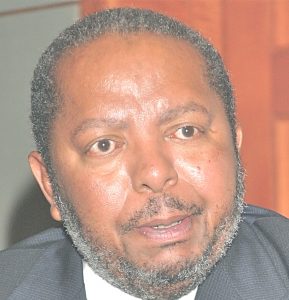Governor cautions on nationalism on path to common currency
August 27, 2018—Governments in the East African Community (EAC) Partners states have been asked not to give in to national self-interests which prevent further economic regional integration and disrupt business across borders as the six countries move towards a common currency.

Mutebile said regional governments should not adopt policies that impede business across the common borders.
“Without going into details, it is a mistake for particular states to pursue policies that interfere with smooth trading policies. Policies like BUBU (Buy Uganda Build Uganda) must be resisted,” Prof. Emmanuel Tumusiime Mutebile told participants to the latest round of the EAC Monetary Affairs Committee (MAC) talks held in Kampala last week.
Mutebile, who is also Governor, Bank of Uganda (BoU), was referring to the revival of a Uganda government policy in 2017 to prioritise purchase of locally made goods and services. This is despite the EAC protocol that calls for a common market that covers Burundi, Kenya, Rwanda, South Sudan, Tanzania and Uganda. However, the EAC is still beset by on and off non-tariff barriers that limit faster intra-regional trade.
Much to the chagrin of trade and industry minister, Amelia Kyambadde who has pushed hard for BUBU, Mutebile is an outspoken critic of the policy. He believes it is a flawed attempt at import substitution which will eventually prove to be expensive for Uganda and goes against the dictates of a regional free market.
The meeting which was attended by central bank Governors and their representatives from all the EAC countries, was intended to review the progress towards the operationalization of the EAC Monetary Union. Sometime before 2030, the EAC wants to have a functional single common currency in place. The location of the proposed East African Central Bank will be determined by where the East African Monetary Institute will be sited and the betting is Kenya which has the deepest and most liquid financial market.
The talks were also intended to review the road map of the EA Monetary Union and its set timelines and review the implementation status of the decisions of the 21th MAC meeting held in Kampala on August 24, 2017.
Mutebile, who is also the chairman of the Monetary Affairs Committee appealed to other central bank Governors to do more to fast-track the treaties of the road map to be able to achieve targets for the operationalization of the monetary union. The EAC is looking to borrow a leaf from the European Union and use of the Euro across most of the member states which began at the turn of the century.
According to a report that was prepared by a technical team, there has been significant process towards operationalization of the EAMU Protocol. Central Banks from all states had made strides on harmonization of monetary policy framework, exchange rate policies, rules and practices governing bank supervision, financial accounting policies as well as payment systems. A number of national laws are also being harmonized.
“In April 2018, the East African Legislative Assembly an enacted the Bill establishing the East African Monetary Institute (EAMI). The Bill now awaits approval from Heads of States in November this same year,” Mutebile said.
However the Governors admitted there have been delays in realising targets set out in the EAMU road map that could impede the full implementation of EAMU protocol.
However the Governors agreed the only way the EAC could withstand global economic shocks like the escalating trade tensions, tightening financial conditions, strengthening of the US dollar and rising commodity prices will be if the Partner States stick together.
Florens Luoga, the Governor, Central Bank of Tanzania said, “There is need to remain vigilant in identifying and building resilience to shocks arising from the recent global developments. There is also need to enhance coordination of fiscal and monetary policies to boost capacity and preparedness to withstand economic shocks.”

 African Heads of state head to South Korea next week for Summit talks
African Heads of state head to South Korea next week for Summit talks
 Trading leads as main source of income for Ugandans
Trading leads as main source of income for Ugandans
 New leadership for bankers’ umbrella as total assets top $12 billion
New leadership for bankers’ umbrella as total assets top $12 billion
 Brussels Airlines to announce Nairobi service
Brussels Airlines to announce Nairobi service
 SITA promises enhanced travel experience after Materna acquisition
SITA promises enhanced travel experience after Materna acquisition
 Saudia’s 105 aircraft order stretches A320neo lead over rival Max
Saudia’s 105 aircraft order stretches A320neo lead over rival Max
